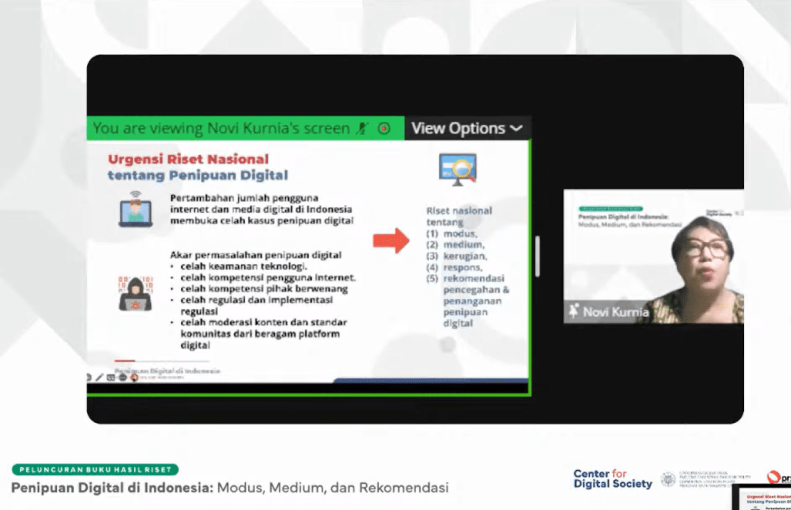
Yogyakarta, August 24th 2022─FISIPOL UGM Center for Digital Society (CfDS) withFisipol UGM Master of Communication Studies as well as PR2Media collaborated in the National Research of Digital Fraud in Indonesia: Mode, Medium, and Recommendation. The research was supported by Whatsapp Indonesia and resulted in a research finding book which was launched in the webinar event held online on Wednesday (24/8).
The webinar was attended by the Dean of Fisipol UGM, Wawan Mas’udi, and plenty of other speakers; Novi Kurnia as the head of the research team, Junico BP Siahaan, Aju Widyasari, Rofi Uddarojat, Nico Siahaan, EDD who is the victim of online fraud, and Engelbertus Wendratama as a researcher in PR2Media and the moderator of the talk show.
The research started because there is anxiety over the rise of social media users in Indonesia which also creates an opening for more digital fraud activity. Novi Kurnia exposed several interesting research findings. From 15 modes of digital fraud mapped in the research finding, the mode of fraud where a reward is promised is the fraud most frequently done, it adds up to 91.2%. Additionally, that type of fraud happens 61,4% through calls or texts.
From the total of 1.700 respondents, as many as 1.132 or 66,6% of respondents said that they were once a victim of digital fraud. However, 50,8% of the victims said that there was no damage that they received, usually because the victims decided not to do anything further about the fraud. Additionally, non-financial damages such as the feeling of fear, trauma, or data leaks have not been considered.
Digital fraud also happens a lot in online transactions. According to Rofi Uddarojat, the Head of Public Policy and Government Relations, fraud usually happens because of the disparity of power between the seller and the buyer. “When we want to do a transaction, us as buyers, we need to see our own position,” Rofi said.
Aju Widyasari, the Director of Telecommunications, Director General of PPI, Kemenkominfo said that digital literacy is needed in our society, “It is needed to raise awareness about how society can respond to information from unknown sources,” Aju said.
According to Nico Siahaan, a member of Indonesia’s House of Representative Chamber I, another thing that we need to make sure of is the protection of the law, for example through a President’s Decree to create a special task force to handle digital fraud. This is also in line with the recommendation from the research team about the creation of a task force from several sectors and relevant stakeholders to fight digital fraud.
